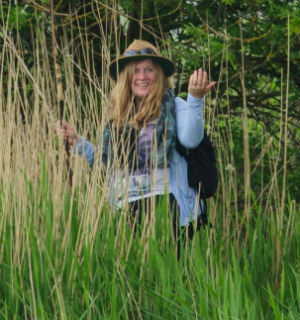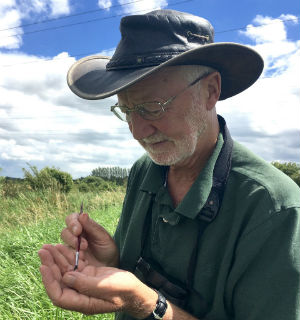Submitted by Administrator on Thu, 07/09/2017 - 08:50
 A study by Dr Jenny York and Prof Nicholas Davies published this week in Nature Ecology & Evolution investigated the puzzle of why female cuckoos utter a conspicuous “chuckle” call after they have taken great care to sneakily lay their eggs in a host's nest, which risks drawing unwanted attention to their crime.
A study by Dr Jenny York and Prof Nicholas Davies published this week in Nature Ecology & Evolution investigated the puzzle of why female cuckoos utter a conspicuous “chuckle” call after they have taken great care to sneakily lay their eggs in a host's nest, which risks drawing unwanted attention to their crime.
“We noticed that female cuckoo chuckle calls share several acoustic features with those of sparrowhawks (who prey on small birds), namely that they are rapidly-repeated, high pitched calls. So we set out to test the hypothesis that the female cuckoo’s hawk-mimicking chuckle serves to trick hosts into fearing for their own safety, thus diverting hosts’ attention from clutch-inspection to self-protection. This could benefit the cuckoo by reducing the likelihood that her egg is rejected, while the host’s attention is misdirected towards the wrong enemy.”
York and Davies used playback experiments to test their hypothesis about the female cuckoo’s puzzling antics. They played recordings of the calls of male and female cuckoos, a sparrowhawk, and a collared dove (as a harmless control) to reed warblers, and then observed the reed warblers’ behaviour.
“Our first playback experiment showed that female cuckoo calls made reed warbler hosts vigilant to the same extent as hawk calls (there was little vigilance in response to calls from male cuckoos or doves). However, vigilance in response to female cuckoos may not necessarily be because they confuse them with hawks, it may simply be because female cuckoos are a threat to hosts.”
The authors then played the four call types to great and blue tits, which are songbirds that are regularly predated by sparrowhawks but are not parasitized by cuckoos, and therefore have no reason to consider cuckoos a threat. Nonetheless, blue and great tits responded vigilantly to female cuckoo calls, suggesting the acoustic similarities are effective. York and Davies then conducted a third experiment to test whether the female cuckoo’s call influences host defences.
 “We painted one reed warbler egg at random to simulate parasitism and then played one of the four calls. The results showed that female cuckoo and hawk calls do indeed reduce egg rejection, compared to male cuckoo or dove calls. So this confirmed that female cuckoo calls serve as an effective deception that improves brood parasitism success”.
“We painted one reed warbler egg at random to simulate parasitism and then played one of the four calls. The results showed that female cuckoo and hawk calls do indeed reduce egg rejection, compared to male cuckoo or dove calls. So this confirmed that female cuckoo calls serve as an effective deception that improves brood parasitism success”.
The fact that both predatory sparrowhawks and female cuckoos call infrequently, and that it is better to misidentify a female cuckoo and end up rearing a cuckoo chick than it is to ignore a sparrowhawk and end up dead, might mean that the female cuckoo has the last laugh in this particular battle between host and parasite.
The paper Female cuckoo calls misdirect host defences towards the wrong enemy, published in Nature Ecology and Evolution, can be found here: http://dx.doi.org/10.1038/s41559-017-0279-3
All photos are reproduced by permission of Jenny York and Dom Cram
